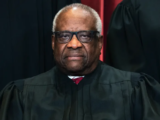By Glynn Wilson –
Conservative U.S. Supreme Court Justice Antonin Scalia, 79, was found dead while visiting a luxury resort in West Texas, according to the San Antonio News-Express.

Conservative U.S. Supreme Justice Antonin Scalia
The death was confirmed by Texas Governor Greg Abbott, according to Reuters, who issued a statement sending his “deepest condolences” to Scalia’s family.
The U.S. Marshal’s service issued a statement saying Scalia was discovered dead Saturday morning when he did not appear for breakfast. Other sources are saying he died in his sleep.
Scalia, appointed to the top U.S. court in 1986 by President Ronald Reagan, was known for his strident conservative views and theatrical flair in the courtroom.
His death comes as the court is set to hear its first major abortion case in nearly 10 years, and ahead of key cases on voting rights, affirmative action and immigration.
Senator Richard Shelby of Alabama, the Republican from Tuscaloosa, Tweeted: “I’m deeply saddened to see reports of the passing of Supreme Court Justice Antonin Scalia.”
I guess the conservative Senator is sad, in more ways than one. Scalia’s death gives President Barack Obama the opening to appoint a more liberal member to the nation’s highest court, potentially bringing the court back into balance after several years of a decidedly rightward slant.
Republican presidential front runner Donald Trump reacted to the news on Twitter.
“The totally unexpected loss of Supreme Court Justice Antonin Scalia is a massive setback for the Conservative movement and our COUNTRY!,” Trump said.
Jay Bookman of the Atlanta Journal-Constitution reported that Scalia’s death “will have profound poiltical, legal consequences.”
CBS News and other news outlets are already beginning to run specials one of the most outspoken conservative justices in American history.
According to the Washington Post, Justice Scalia was “known for his intellect, wit and biting opinions. He had huge impact on the high court.”
“While I differed with Justice Scalia’s views and jurisprudence, he was a brilliant, colorful and outspoken member of the Supreme Court,” said Democratic contender for President and Vermont Senator Bernie Sanders. “My thoughts and prayers are with his family and his colleagues on the court who mourn his passing.”
Republicans lined up to try and force the Senate to block any appointments from President Obama over the next year, which could provide fodder for the presidential campaign. The longest it’s ever taken to confirm a Supreme Court nominee is 125 days. Obama has 341 days left in office.
“Can’t wait to watch the GOP try to BS this one,” one commenter said on Twitter.
According to a counterpoint posted on Twitter by Edward Snowden: “Failing to confirm a Scalia replacement could significantly increase voter turnout, which historically works against GOP.”
As for the President, according to White House Principal Deputy Press Secretary Eric Schultz: “This afternoon the President was informed of the passing of Supreme Court Justice Antonin Scalia. The President and First Lady extend their deepest condolences to Justice Scalia’s family.”
“Much will be written about his legacy in the coming days and weeks, but for now, the big question on everyone’s minds is what this means — especially in a Supreme Court term with big issues like affirmative action, abortion, contraception, union rights and voting rights on the docket,” David S. Cohen wrote on deadline for Rolling Stone. “With a vacancy on the Court, the responsibility to fill it falls on President Obama and the Senate; pursuant to Article II, section 2 of the Constitution, the president nominates justices of the Supreme Court, and the Senate confirms them with a majority vote.”
Enter bitter partisan politics, he writes, “with a heaping dose of election-year dysfunction.”
In a normal situation, given the huge divide between President Obama and the Republican-controlled Senate, it would be very hard for Obama to get a Supreme Court justice confirmed. This year, though, Republicans are going to hope that they can push this off until they win the presidential election and can appoint their own replacement. In other words, there’s very little incentive for the Republican Senate to move quickly.
And it’s even more complicated than usual: If Justice Scalia is replaced with a liberal, that would tilt the Supreme Court to a 5-4 liberal majority (broadly speaking). Everyone in Washington knows this, meaning the stakes are even higher than they would be if a seat on the Court currently filled by a liberal were to open. The Democrats are salivating over this possibility; for Republicans, it’s their greatest nightmare. They will fight President Obama’s nominee tooth and nail, which means the seat could stay open for a long time.
So what happens to the cases currently before the Court? The Court will continue functioning, even with only eight Justices. Cases with five (or more) justices in the majority will have the same result as they would with nine justices.
But what about cases with an even split, which is now a real possibility? Four-four decisions are a strange beast in the Supreme Court; they are rare, but they have happened. And when they do, they result in the lower court’s decision remaining the law, but there being no opinion from the Supreme Court and no nationwide effect.
For this term, what this means is that Roe v. Wade is safe. In the abortion case currently before the Court, the Texas federal appeals court found Texas’ abortion restrictions constitutional. If Justice Kennedy, the swing vote, believes the restrictions are unconstitutional, the outcome would be the same now as before: a five-justice majority striking the law down (assuming the four liberals join him, which is a good assumption).
But if he decides the law is constitutional (and the four liberals think it’s unconstitutional), that would result in a 4-4 decision. The appeals court decision would remain, which would mean the Texas restrictions could go into effect. This would be disastrous for the women of Texas. However, many people feared this case would be a vehicle for the Court to overturn Roe v. Wade. A 4-4 decision cannot do that. Roe is safe.
Affirmative action, though, remains on the chopping block. The case before the Supreme Court now involves the University of Texas’ affirmative-action plan. The federal appeals court upheld the plan, finding it constitutional. Without Justice Scalia, there are now seven justices considering that case because Justice Kagan recused herself, having worked on the case before becoming a justice.
What this means is that the calculus from before is the same: Justice Kennedy will be the swing vote. However, this time it will be which side of a 4-3 decision he’ll be on.
Every issue that has a likely liberal/conservative divide and is now pending before the Supreme Court has to be assessed in the same way. With the likelihood of an extended vacancy high, we will probably see a slew of 4-4 decisions coming our way.
What Antonin Scalia’s Death Means for the Supreme Court and the Country
This is unless President Obama makes a quick choice and is able to mollify the Senate. But don’t count on it. There will be a partisan battle before the dust settles on this story.













